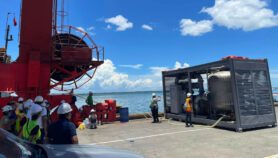By: Jia Hepeng
Send to a friend
The details you provide on this page will not be used to send unsolicited email, and will not be sold to a 3rd party. See privacy policy.
[BEIJING] China is preparing to launch its fourth unmanned space vehicle as part of a programme that could see it become only the third nation to send a person into space.
Plans are being made to launch the test spaceship before the end of this year. The country’s first astronaut could be a reality as soon as 2005, according to Zhang Qingwei, president of the state-owned company China Aerospace Science and Technology Corp (CASC).
He said at a meeting yesterday (13 August) that although the spaceship, called Shenzhou IV (‘Divine Vessel IV’) has the capacity to carry humans, it will remain unmanned on this next mission “to ensure the absolute safety of our astronauts’’.
The country’s space programme, led by CASC, has launched three space vehicles in the past three years. In March, China successfully launched the unmanned Shenzhou III, which returned after seven days having circled the earth 108 times.
Such missions have allowed Chinese scientists to perform a series of space experiments from testing the survival of animals to the breeding of new plants.
Zhang’s research group is developing a new family of powerful launch vehicles, powered by non-toxic, non-polluting liquid hydrogen, liquid oxygen and refined kerosene, which is intended to enable China to launch a series of satellites made both at home and abroad.
“We are heading for breakthroughs in technologies related to spaceship docking, space labs and deep-space exploration,’’ said Zhang.
An earlier report, which has not been confirmed by official sources suggested that 14 pilots had been selected to receive space aviation training in China. Su Shuangning, director of the China Aerospace Medical Institute, was quoted as saying in July that the astronaut candidates were of high physical quality and that China’s medical technologies to support space aviation had developed toward a mature stage.
© SciDev.Net 2002













